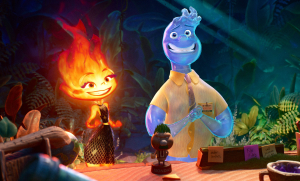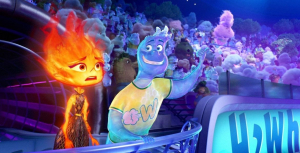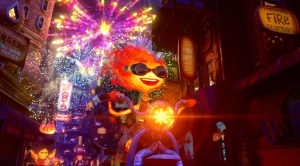
When operating at full capacity, Pixar is an unbeatable powerhouse, creating innovative, engaging, and scintillating movies that inspire the soul and ignite the imagination. However, the animation studio, celebrated for heartwarming masterpieces such as “Toy Story,” “Ratatouille,” “Up,” and “Inside Out&rdqu...



ELEMENTAL
When operating at full capacity, Pixar is an unbeatable powerhouse, creating innovative, engaging, and scintillating movies that inspire the soul and ignite the imagination. However, the animation studio, celebrated for heartwarming masterpieces such as “Toy Story,” “Ratatouille,” “Up,” and “Inside Out”—which easily made the top of the list of the best movies in the years they were released—seems to have lost its previous streak of brilliance.
Modern-day Pixar appears to have shifted their attention to creating sequels for their super successful movies-like “Toy Story 4,” “Incredibles 2,” “Lightyear”-rather than developing entirely new storylines. More notably, their recent original releases, including “Soul,” “Luca,” and “Turning Red”, have all shared the odd trend of characters morphing into animals. It seems that the magic that used to be evident in Pixar's works and its knack for setting up high-concept premises and seamlessly maneuvering the details has faded.
Pixar’s most recent release, “Elemental,” seems to be a reflection of the studio’s struggles. Its narrative appears contrived, and its world-building sloppy, which is an injustice to the talents of the animators who worked on it. The film, set in a city where the natural elements, fire, water, and air are personified as social classes, is directed by Peter Sohn and written by John Hoberh, Kat Likkel, and Brenda Hsueh. But its ambitious metaphor crumbles under its clumsy execution and consequent racial undertones.
Premiering on the closing night of the 76th Cannes Film Festival, "Elemental" paints a picture of a bustling urban jungle reminiscent of Disney’s “Zootopia,” where racial discrimination was awkwardly oversimplified as "predator and prey" dynamics. Similarly, in Element City, there is an ill-advised simplification at play, creating an unsettling comparison of the element of fire to all immigrants and the element of water to the white upper class.
The film's main character is Ember Lumen, a fiery-tempered flame spirit voiced by Leah Lewis, who works in her father's store in Firetown, an area isolated for its fire inhabitants. A series of events leads Ember to form an unexpected bond with a water inspector, Wade, voiced by Mamoudou Athie. Despite the unwritten rule that 'elements do not mix' in Element City, their relationship progresses into a forbidden romance that forms the slight yet charming highlight of the film.
However, the cliche-ridden storytelling hampers any potential enhancement of the engaging characters. Despite muddled visual storytelling and failed attempts at layered subtexts, there are glimpses of magic in the form of vibrant character animation and bold colors and form. However, this promise of creativity is overshadowed by a narrative that leaves a lot to be desired.
In comparison to Pixar classics like " Finding Nemo" and "Wall-E," "Elemental" significantly falls short. The only exception is an involving score by Thomas Newman that draws influences from a range of global musical traditions. All in all, ”Elemental”, although somewhat catchy during streaming, rapidly evaporates from memory post-viewing.
In conclusion, while there are bits of the classic Pixar charm and brilliance present in "Elemental," it undeniably falls short of the standard set by its predecessors. Despite the occasional splash of vibrant animation and momentary spark of engaging storytelling, these elements are sadly muffled by a predictable, tired narrative and a somewhat clumsy execution of conceptual metaphor. The legacy of bold and imaginative storytelling that Pixar earned through its past films is not strongly echoed in "Elemental." It doesn't quite manage to recreate the captivating worlds that Pixar is renowned for, leaving one to yearn for the emotionally resonant and brilliantly executed films that Pixar once never failed to deliver.


